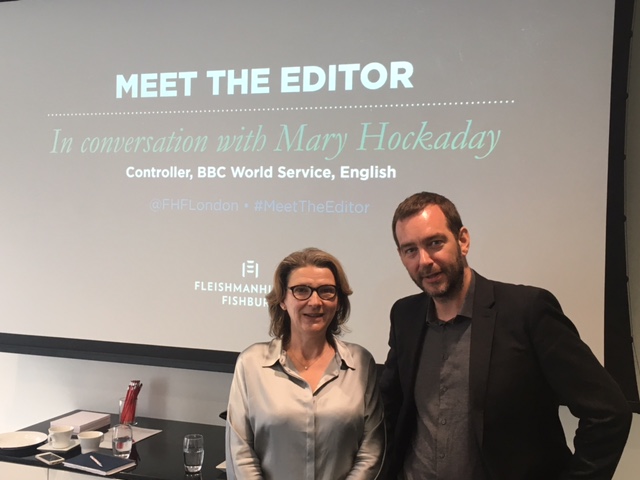Five Things We Learned From the BBC's Mary Hockaday
Today we were pleased to host Mary Hockaday, Controller, BBC World Service, English, as the latest guest in our Meet the Editor series.
Mary had a long and distinguished career at the BBC before starting her current posting at the World Service. Through the years she’s been in charge of the News at Six and Ten, the BBC News Channel, the BBC Radio Newsroom and the BBC News website. She’s also worked for Today, The World at One and Radio 5Live.
She joined us to talk about one of the busiest newscycles of her journalistic life, the common feeling of ‘bad news fatigue’ and the rise of ‘solutions journalism’. Here are the five things we learnt…
 Change just keeps coming – both out in the world and back in the newsroom
Change just keeps coming – both out in the world and back in the newsroom
Mary described the feeling of covering 2016 as, in essence, ‘kapow!’ – so much major news, and so much of it against the expert predictions. With serious on-going stories like the Syrian civil war, no-one expected this year to be a quiet one, but six months into 2017 it’s already another major news year. In the midst of covering all this news, journalists are continuing to battle with fundamental changes in their own industry, as the importance of digital news delivery grows and reporters learn to deal with the new reality of ‘fake news’ and hoax images. While the BBC are well equipped for this, with a team of experts around the world and specialists trained in spotting hoax images, wider issues such as how to maintain brand credit across multiple digital outlets is an open challenge.
- There are two big stories in America that are going under the radar – Democrats and regulation
There’s no doubt that the saga of President Donald Trump is a fascinating story, involving domestic, foreign and media angles all worth pursuing. But it’s important to note that real change is taking place in the background – regulations and rules are already changing. The other big background story is the that Democrats are still in disarray from the election, and their success or failure in the mid-terms will be the key element in what happens to the Republicans’ efforts to reshape America after two terms of President Obama.
- Solutions journalism is a chance to tell us how your client is ‘fixing the world’
Travelling widely for work, Mary found that many audiences have ‘bad news fatigue’, and young people in particular want to be engaged in how people can change the world. Young people in developing countries have a much more optimistic view of the world than they saw reflected in the news agenda. The World Service has been developing formats to report on ‘people fixing the world’, part of a wider journalistic trend known as ‘solutions journalism’. An early example was a group of education journalists in Seattle who’d broken from years of negative coverage by reporting on how an outlier school had achieved their amazing results, but with traditional journalistic rigour. This is a great opportunity for clients to tell their good news stories, but be prepared – it’s not a fluff piece, the evidence has to stack up.
- Getting business stories on the World Service is about the human element
The best way to pitch your client’s story to the World Service is to go through the business unit. If you’re targeting one of the many special shows or segments, such ‘The Food Chain’, make sure you’ve listened to the programme and understand the format, and have checked some of the previous episodes to be sure you’re not pitching something they’ve done recently. At its heart the World Service is about human stories, part of their heritage as one of the oldest radio broadcasters in the world. Yes it’s global, it’s about news and business, but always figure out how you can illustrate your story in human terms.
- The world is looking to Britain for news, both as subject and provider
International audiences are very interested in what’s going on in the UK – MH described how when she’s travelling in Europe she’s often pressed by Europeans to explain what’s really behind the decision to leave the EU, but when she’s travelling more widely a lot of people are much less perplexed by the decision. But the world isn’t just interested in the UK as a news topic – the BBC are known around the world as a reliable, impartial source of information, something that’s more important than ever and unfortunately something of a rarity in many countries around the world.
Cody Want, Senior Account Executive, Corporate Comms
Find Out More
-
Platinum CMS Award
March 13, 2024
-
Changing Communications Tack at Mobile World Congress
February 21, 2024


